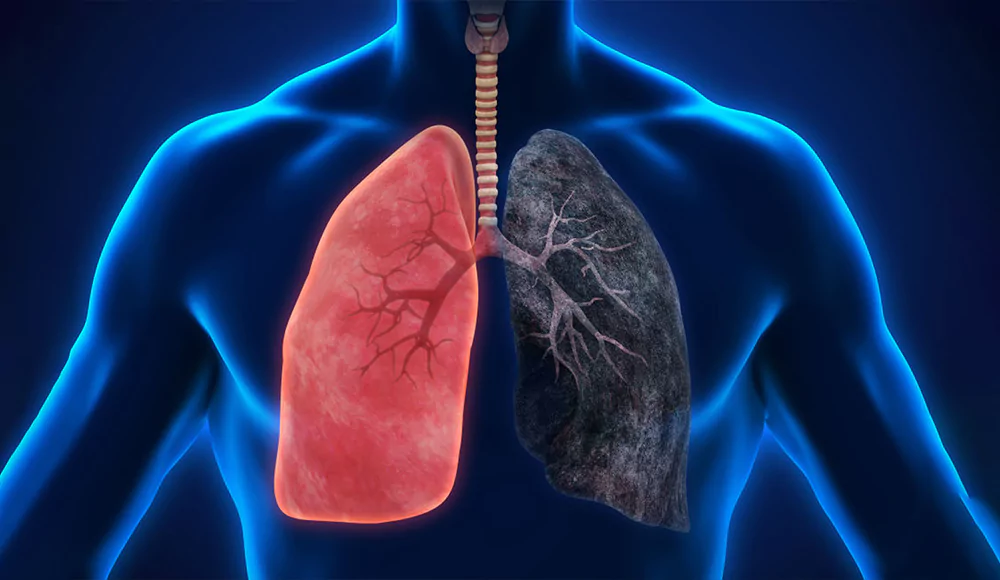
5 Effective Tips for How to Cleanse Your Lungs After Quitting SmokingSo, you’ve recently stubbed your last cigarette? You might have a feeling of accomplishment, right? You absolutely should. Quitting smoking is a crucial step towards a healthy life.
While you’re thinking of quitting smoking, you might be curious to know about its benefits. No matter where you are in the process, there is a common question lingering in your mind: “How to Cleanse Lungs After Quitting Smoking?”
There is no instant solution to restore your lungs to their pre-smoking state. But there are few steps that you can take to get a quick fix after your last cigarette.
Let’s explore some useful tips to follow that help you lungs to “Self-clean”.
How to Cleanse Lungs After Quitting Smoking?
After quitting smoking, you might feel the need to “clean” your lungs to remove tar from your lungs.
There might be a question: “Can smoker lungs recover?” Luckily, your lungs are capable of self-cleaning and start the process once you stop smoking. Always remember, your lungs are a remarkable organ with the potential to repair themselves over time in certain situations.
So, once you quit smoking, your lungs begin to heal and regenerate gradually. The rate of healing depends on how long you smoked and the extent of the lung damage.
Smoking causes mainly two type of lung damage:
Emphysema: This condition destroys the small air sacs in the lungs, called alveoli, reducing the lung’s surface area and impaired oxygen exchange.
Chronic Bronchitis: This medical condition inflames the smaller airways leading to the alveoli, hindering oxygen from reaching the.
Altogether, these conditions are known as Chronic Obstructive Pulmonary Disease (COPD).
How Long Does It Take to Self-cleanse Your Lungs?
According to the American Cancer Society report, between 2 weeks and 3 months after quitting smoking, you may observe an improved lung function as your lungs begin the self-cleaning process.
During the first year after stopping smoking, symptoms like coughing and shortness of breath will decrease. At that time, your lungs improve their ability to clean themselves, reducing the risk of lung infection.
As your lungs continue to self clean and heal over time, you will keep experiencing the health benefits of quitting smoking.
How to Cleanse Lungs After Quit Smoking: The Natural Ways
You can’t reverse the lung damage caused by your years of smoking habits. But there are few natural steps you can take to prevent further damage and improve lung health.
Coughing:
Dr. Keith Mortam, the Director of Thoracic Surgery at the George Washington Medical Faculty Associates in Washington, D.C., states that the smokers often have a lot of mucus buildup in their lungs which may persist after quitting smoking.
Coughing can help to remove tar from lungs, clearing the smaller airways and allowing better oxygen flow.
Physical Exercise:
Physical activity is crucial for maintaining and improving lung function. Dr. Mortman highlights that even a simple walk can help keep the air sacs in your lungs open, facilitating better oxygen exchange.
Avoid Pollutants:
Avoiding secondhand smoke, dust, mold and chemicals is essential for healthy lung function. Recent animal studies have shown that exposure to filtered air reduces mucus production, which can block smaller airways and hinder oxygen intake. Check air quality reports and limit outdoor time on days with poor air quality.
Drink Warm Fluids:
Staying hydrated is quite vital for lung health. Drinking 64 ounces of water daily keeps mucus thin, making it easier to expel when coughing. Warm beverages like tea, broth or hot water can help thin mucus, easing its removal. Green tea has anti-inflammatory properties that may help prevent some lung diseases.
If warm drinks are not appealing, try steam therapy by inhaling water vapor to thin mucus and reduce airway inflammation.
Eat Anti-Inflammatory Foods:
Inflammation in a smoker’s lungs can make breathing difficult. While a diet high in anti-inflammatory foods has not been proven to prevent lung inflammation, research suggests it can reduce overall body inflammation. Anti-inflammatory foods include blueberries, cherries, spinach, kale, olives and almonds.
What is the Outlook for the People Who Quit Smoking?
Here is a summary of what happens after your last cigarette. The report is based on American Cancer Society survey, let’s check
Benefits after Quit Smoking:
20 minutes: Your heart rate and blood pressure normalize.
12 hours: Carbon monoxide levels in your blood return to normal.
48 hours: Your sense of taste and smell begin to improve.
2 weeks–3 months: Lung function improves, and you may experience less shortness of breath.
1 month–1 year: Coughing and shortness of breath decrease.
1 year: Significant improvement in breathing and exercise tolerance.
1–2 years: Risk of heart attack significantly lowers.
5–10 years: Risk of mouth, throat, and laryngeal cancer is halved, and stroke risk decreases.
10 years: Risk of lung cancer is halved compared to a smoker. Risk of bladder, esophageal, and kidney cancer also decreases.
15 years: Risk of coronary heart disease is similar to that of a nonsmoker.
How Do Heavy Smokers Detox Lungs?
Heavy smokers detox lungs by quitting smoking, engaging in regular exercise, staying hydrated, and consuming antioxidant-rich foods.
Studies show lung function can improve by 30% within 2 weeks to 3 months after quitting.
What is the Best Detox for Lung?
The best lung detox includes quitting smoking, maintaining hydration, exercising regularly, and consuming anti-inflammatory foods like blueberries and spinach.
Research indicates these methods can reduce mucus and improve lung health by up to 40%.
The Bottom Line
Remove tar from lungs after quitting smoking is not just about improving your health; it’s about reclaiming your vitality and embracing a future of better well-being.
By implementing these above-mentioned tips and tricks you’re not only aiding your lungs in their recovery but also paving the way for a brighter, smoke-free future.
Remember, every step you take today toward lung health is a step toward a longer, happier life. So, commit to these practices, and let your journey to cleaner, healthier lungs begin!
So, you’ve recently stubbed your last cigarette? You might have a feeling of accomplishment, right? You absolutely should. Quitting smoking is a crucial step towards a healthy life.
While you’re thinking of quitting smoking, you might be curious to know about its benefits. No matter where you are in the process, there is a common question lingering in your mind: “How to Cleanse Lungs After Quitting Smoking?”
There is no instant solution to restore your lungs to their pre-smoking state. But there are few steps that you can take to get a quick fix after your last cigarette.
Let’s explore some useful tips to follow that help you lungs to “Self-clean”.
How to Cleanse Lungs After Quitting Smoking?
After quitting smoking, you might feel the need to “clean” your lungs to remove tar from your lungs.
There might be a question: “Can smoker lungs recover?” Luckily, your lungs are capable of self-cleaning and start the process once you stop smoking. Always remember, your lungs are a remarkable organ with the potential to repair themselves over time in certain situations.
So, once you quit smoking, your lungs begin to heal and regenerate gradually. The rate of healing depends on how long you smoked and the extent of the lung damage.
Smoking causes mainly two type of lung damage:
Emphysema: This condition destroys the small air sacs in the lungs, called alveoli, reducing the lung’s surface area and impaired oxygen exchange.
Chronic Bronchitis: This medical condition inflames the smaller airways leading to the alveoli, hindering oxygen from reaching the.
Altogether, these conditions are known as Chronic Obstructive Pulmonary Disease (COPD).
How Long Does It Take to Self-cleanse Your Lungs?
According to the American Cancer Society report, between 2 weeks and 3 months after quitting smoking, you may observe an improved lung function as your lungs begin the self-cleaning process.
During the first year after stopping smoking, symptoms like coughing and shortness of breath will decrease. At that time, your lungs improve their ability to clean themselves, reducing the risk of lung infection.
As your lungs continue to self clean and heal over time, you will keep experiencing the health benefits of quitting smoking.
How to Cleanse Lungs After Quit Smoking: The Natural Ways
You can’t reverse the lung damage caused by your years of smoking habits. But there are few natural steps you can take to prevent further damage and improve lung health.
Coughing:
Dr. Keith Mortam, the Director of Thoracic Surgery at the George Washington Medical Faculty Associates in Washington, D.C., states that the smokers often have a lot of mucus buildup in their lungs which may persist after quitting smoking.
Coughing can help to remove tar from lungs, clearing the smaller airways and allowing better oxygen flow.
Physical Exercise:
Physical activity is crucial for maintaining and improving lung function. Dr. Mortman highlights that even a simple walk can help keep the air sacs in your lungs open, facilitating better oxygen exchange.
Avoid Pollutants:
Avoiding secondhand smoke, dust, mold and chemicals is essential for healthy lung function. Recent animal studies have shown that exposure to filtered air reduces mucus production, which can block smaller airways and hinder oxygen intake. Check air quality reports and limit outdoor time on days with poor air quality.
Drink Warm Fluids:
Staying hydrated is quite vital for lung health. Drinking 64 ounces of water daily keeps mucus thin, making it easier to expel when coughing. Warm beverages like tea, broth or hot water can help thin mucus, easing its removal. Green tea has anti-inflammatory properties that may help prevent some lung diseases.
If warm drinks are not appealing, try steam therapy by inhaling water vapor to thin mucus and reduce airway inflammation.
Eat Anti-Inflammatory Foods:
Inflammation in a smoker’s lungs can make breathing difficult. While a diet high in anti-inflammatory foods has not been proven to prevent lung inflammation, research suggests it can reduce overall body inflammation. Anti-inflammatory foods include blueberries, cherries, spinach, kale, olives and almonds.
What is the Outlook for the People Who Quit Smoking?
Here is a summary of what happens after your last cigarette. The report is based on American Cancer Society survey, let’s check
Benefits after Quit Smoking:
20 minutes: Your heart rate and blood pressure normalize.
12 hours: Carbon monoxide levels in your blood return to normal.
48 hours: Your sense of taste and smell begin to improve.
2 weeks–3 months: Lung function improves, and you may experience less shortness of breath.
1 month–1 year: Coughing and shortness of breath decrease.
1 year: Significant improvement in breathing and exercise tolerance.
1–2 years: Risk of heart attack significantly lowers.
5–10 years: Risk of mouth, throat, and laryngeal cancer is halved, and stroke risk decreases.
10 years: Risk of lung cancer is halved compared to a smoker. Risk of bladder, esophageal, and kidney cancer also decreases.
15 years: Risk of coronary heart disease is similar to that of a nonsmoker.
How Do Heavy Smokers Detox Lungs?
Heavy smokers detox lungs by quitting smoking, engaging in regular exercise, staying hydrated, and consuming antioxidant-rich foods.
Studies show lung function can improve by 30% within 2 weeks to 3 months after quitting.
What is the Best Detox for Lung?
The best lung detox includes quitting smoking, maintaining hydration, exercising regularly, and consuming anti-inflammatory foods like blueberries and spinach.
Research indicates these methods can reduce mucus and improve lung health by up to 40%.
The Bottom Line
Remove tar from lungs after quitting smoking is not just about improving your health; it’s about reclaiming your vitality and embracing a future of better well-being.
By implementing these above-mentioned tips and tricks you’re not only aiding your lungs in their recovery but also paving the way for a brighter, smoke-free future.
Remember, every step you take today toward lung health is a step toward a longer, happier life. So, commit to these practices, and let your journey to cleaner, healthier lungs begin!
